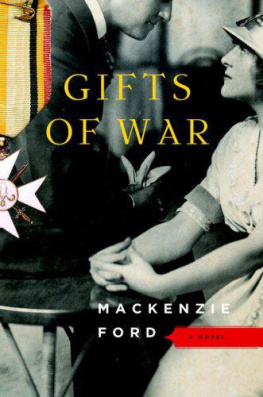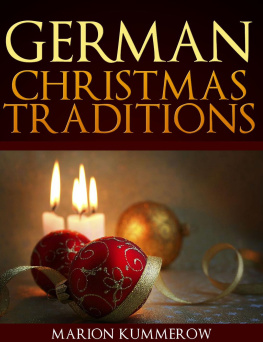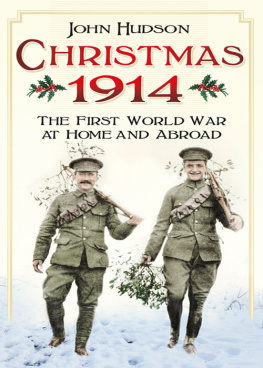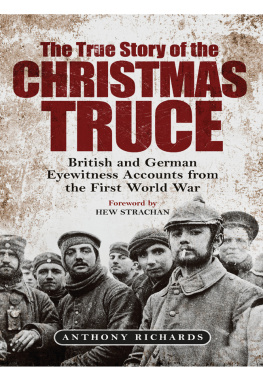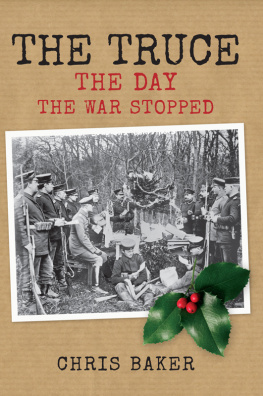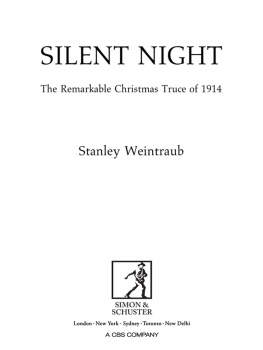
To: K .
CONTENTS

The Majestic Hotel, Paris, May 1919
IT IS TWO A.M., RAINING HARD , and the cobblestones on the Avenue Victor Hugo are glittering like a thousand silver spoons. Vast puddles are forming in the gutters, black as ink. There are more cabs battling the rain than you would expect at this hour, the hides of the horses shiny and sleek. The clatter of their hooves is muted by the hiss of wind and rain. Oblivious to the weather, two lovers embrace under a tree. I hear dance music faintly from the ballroom several stories below me. How far away the war seems already.
The war. Some people are already calling it the Great War, not because great moral issues were settlednot at allbut because of the number of young men killed: a whole generation has gone. I survived the war. In fact, and ironically, paradoxically, the Great Warif that is what it wasbrought me the greatest happiness I have known.
By now, I suppose, everyone has heard of the Christmas truce of 1914. From Christmas Eve to Boxing Day, all along the Western Front, some six hundred miles from Belgium to Switzerland, ordinary soldiers on both sides of the war, and in marked defiance of orders from High Command, laid down their arms, hauled themselves from their trenches, and clambered into no-mans-land to fraternize with the enemy. In some cases, the truce had been prepared with the exchange of messages, scribbled on paper and thrown across the barbed-wire defenses in used tobacco tins: You no shoot, we no shoot. In other places, the truce was more spontaneous. Soldiers suddenly appeared, without weapons, carrying a white flag tied to a broken tree branch or, on our side, a cricket stump. The other side responded in like manner, and men met in the middle, to exchange cigarettes, swap buttons or badges, and complain about the higher-ups.
A week or so later the newspapers were full of it. Ordinary Tommies and Fritzes had written home to their parents, and some had forwarded their sons letters to the press. I remember one headline that read THE TRUCE OF GOD, which I thought missed the point. Why had God allowed this damned war in the first place?
No one knows my story, though, which began during the Christmas truce and would notcould nothave happened without it. This has been my secret for nearly four long years; I have guarded it more closely than any of the innumerable military, political, and economic secrets with which I have been entrusted in that time. But now something has happened and I must set down my story. You will see why.

HAD IT NOT BEEN FOR THE WAR , Christmas 1914 would have been straight out of a fairy tale. On 24 December the weather changed abruptly. Along the Front it turned bitterly cold, and the sun that shone all afternoon was too weak to unfreeze the puddles of muddy water that stretched everywhere. Rats and rabbits skittered on the ice, and even the liceas dug in as we were, in our hair and clothing seemed lethargic in the cold conditions. It was a better day than most for scratching. That night a thin cloud cover formed but the temperature didnt ease up and a light snow fell, dusting the desolate landscape with a fine layer of crystals. The branches of dead treeswhat trees remained standingbecame lit in an unnatural way, rather like actors onstage are lit from reflected light below. What was beginning to be familiar terrain suddenly took on a strange, eerie appearance and I remember wondering whether I had, in fact, been shot and killed and was now looking onto the other sidea version of hell that had indeed frozen over.
But no, the eeriness was all too real. That night, as midnight approached, when it was already Christmas by their time, but not with us, we heard movement in the German trenches. Where we were, they were about eighty yards awayno moreso sounds carried. First one, then another small fir tree was hoisted on to the lip of their trenches, lit by candles. One of our sharpshooters fired at one of the trees, and knocked it back down out of sight. This normally would have brought a burst of answering fire from the Germans, but not this time. All was quiet. I barked an order, the sharpshooter made no attempt to fire at the second tree, and we waited. After a delay, there was a small commotion on the German side and another candelit tree was positioned on the lip of their trench. This time we left it alone.
Again we waited. Some minutes afterward we heard the strains of a mouth organ, a trembling, unassertiveeven vulnerablesound, which only just carried across the distance. Its tone was plaintive, melancholy. The musician played a few bars and then voices joined in. The song, which I recognized, was Die Wacht am Rhein, The Watch on the Rhine, based on a nineteenth-century German poem. The clouds had gone by now and the Front had a stark beauty in the clear moonlight. On our side we had all but forgotten the cold.
As the song ended, one of our men shouted, Guten singing, Fritz! or something very like it. We all laughed and cheered. After a short silence, the mouth organ started up again, and the Germans gave us Stille Nacht Silent Night, which of course allowed us the opportunity to join in with English words. What a scene! Two groups of men, in ditches eighty yards apart, who hours before had been doing their level best to slaughter one another, singing in unison. Well, almost.
Everyone sensed that this was something historic. It was one of those moments in life when everyoneeveryoneraised his game, and no one who was there will ever forget it.
I was twenty-three then, and a second lieutenant in the Forty-seventh Gloucestershire Rifles. I was born and grew up in Edgewater, a tiny Cotswold hamlet not far from Stroud. My school career had its momentsmostly wrong moments. I was good at languages but that was about it. I was caught smoking twice and fighting twice. These fights werent brawls but midnight bare-knuckle knockout bouts in the school ringthis is how arguments were settled in my school, and highly illegal.
Twenty-three was a little old for the rank I held, that being mainly due to the fact that I had delayed my degree at Cambridge, to spend two years inof all placesGermany. My father had been more impressed by my facility with foreign languages than I was myself and at his expense I spent one year in Berlin and another in Munich, brushing up my German (though not only that). The prewar years in Germany, in Munich especially, were the great years of modernism. The birth of abstract painting took place there, the first forays into cabaret; the great novels of Thomas and Heinrich Mann were written in the city. What a time! It was in Munich that I learned to drink and to swear. I dabbled in painting, song writing, and I lost my virginity. I played the tables, lost my allowance, worked as a bouncer in the casino to pay off the debt (the boxing came in handy). I visited hermaphrodite strip shows, learned to nurse a drink for hours on end in all-night piano bars, and took part in everything the new century had to offer. I never knew whether this is what my father had intended for me, but I loved most of my time in Germany and silently thanked him all the same.
So I didnt go up to Cambridge until I was twenty and therefore didnt come down until May 1914, just before I turned twenty-three. Id been working in publishing in London for all of six weeks when war broke out.
Despite my Munich-inspired sophistication, my familiarity with abstract art, continental women, foreign food, and fashion, like so many others I didnt see the Great War coming. And, like so many others, I volunteered immediately. My father was half-pleased. He was always a rather distant man, whom I respected rather than loved. We never really talked about it, but I think he understood the danger more than I did. I suspect he thought that I would get a betterand maybe safercommission if I volunteered early. He thought my German would help to get me a billet in intelligence, away from the front line. He was wrong: what was most wanted in the early days was infantry, fighting menor, as the skeptics in the newspapers insisted, cannon fodder.
Next page
